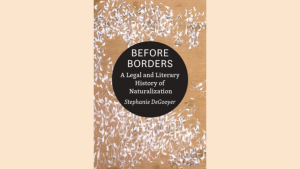Last November, DOECL Professor Stephanie DeGooyer published Before Borders: A Legal and Literary History of Naturalization through Johns Hopkins University Press. DeGooyer’s second book “follows how naturalization evolved in England against the backdrop of imperial expansion and laid the groundwork for a dramatically new vision of subjecthood and nationality.”
In speaking to her inspirations for this project, Professor DeGooyer said:
“There were several things that ignited this project. In general, I was compelled to write an early history of naturalization because I could not find much research on immigration before the nineteenth century. For the most part, historians have been interested in the rise of race-based restrictions in the nineteenth century. I wanted to discover what came before. When and how did countries manage the arrival of newcomers before the codification of nationality law? What was different about immigration before the rise of the nation-state? How did something like naturalization rub against the tradition of natural law, which ruled that a person’s allegiance could never be shifted?
“I also wanted to write the book to show how many canonical novels—from Robinson Crusoe to Frankenstein—were concerned with the naturalization of foreigners. This is important because many eighteenth and nineteenth-century novels have been understood by readers as symbols of nationalism and nativism. But as I show, they were part of a major debate in the period about what it meant to migrate and shift national affiliations.”
Professor DeGooyer’s favorite part of working on Before Borders included “reading several common law cases related to the naturalization of foreigners”:
“In their reports, justices use elaborate metaphors and similes to explain how the law could, or could not, create new subjects. One justice, for example, argued that naturalization was a ‘cure’ of an alien’s detects that restored them to their healthy state. These reports are rarely read in full. I enjoyed pulling the ‘logics’ apart to see how early modern judges and lawyers tried to manipulate time and space to make a new immigration law consistent with natural law.”
The most challenging portion of this book lied in its bidisciplinarity:
“In writing it, I had to not only read both legal and literary archives, but I also had to read like a lawyer and literary critic. One of the problems for literary scholars, as I note in the introduction, is that we do not know much about the history of nationality law. When we speak about globalizing our studies, or of transnational fiction, we often do so without a tangible sense of how nationality works. I had to become fully versed in a lot of law and history that most literary historians do not read. But it was remarkable how these new histories opened up dramatically new literary readings, and, vice versa, how attention to metaphors and similes used by lawyers and judges allowed for new understandings of law in the period. In the coda, I advocate for something called ‘strong reading.’ What I mean by that is that literary and legal scholars should embrace the strengths of each field and rigorously read each other. Obviously, this is hard!”
Dr. Samuel Moyn, a professor at Yale University, praises Before Borders for its “illuminating premise that becoming a citizen is a ‘naturalization’ as much a fictional as it is a historical and political act of states.”
Dr. Deidre Shauna Lynch of Harvard University also emphasizes DeGooyer’s innovative approach to the studies of naturalization:
“Before Borders is a luminous and persuasive account of a forgotten dimension of legal history in which naturalization does not involve assimilation. DeGooyer has an enviable gift for historical narrative, and her revisionist account of the early novel as working analogously with naturalization law adds to the critical vocabulary of world literature.”
Congratulations Professor DeGooyer!


